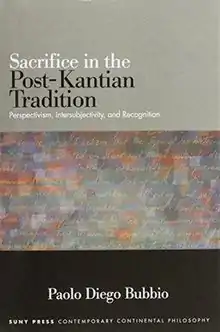 Cover | |
| Author | Diego Bubbio |
|---|---|
| Country | United States |
| Language | English |
| Subject | Sacrifice |
| Publisher | SUNY Press |
Publication date | 2014 |
| Media type | |
| Pages | 226 pp. |
| ISBN | 978-1-4384-5252-4 |
Sacrifice in the Post-Kantian Tradition: Perspectivism, Intersubjectivity, and Recognition is a 2014 book about sacrifice by the philosopher Paolo Diego Bubbio, in which the author provides a historical and theoretical analysis of the development of the concept of sacrifice through the works of Kant, Karl Solger, Hegel, Kierkegaard, and Nietzsche.[1]
Summary
Bubbio's main thesis is that there is a strong interrelation between the kenotic conception of sacrifice and the tradition of Kantian and post-Kantian idealism. In other words, this conception of sacrifice can be seen in the works of most of the thinkers of the post-Kantian tradition.
Bubbio argues that the very possibility of a “realm of reason” made up by values and norms depends on the recognition of “the other” as another human being. Particularly he emphasizes the reciprocal connection of the Hegel's recognition-theoretic approach and his emphasis on kenotic sacrifice, both of which are evidence of his belonging to perspectivism. Bubbio takes this kind of perspectivism as a fundamental feature of the post-Kantian tradition.
Reception
Sacrifice in the Post-Kantian Tradition was reviewed by the philosophers Gianni Vattimo, Chris Fleming, Mark Alznauer, and Patrick Stokes.[2][3][4][5]
Vattimo writes: "… Bubbio’s book is an important philosophical work: not only as an excellent analysis of sacrifice in the post-Kantian tradition but also—and perhaps especially—because it confronts what is more alive in contemporary philosophy in a clear and productive way." Fleming writes: "Bubbio’s particular talent is for re-excavating the history of Western philosophy and asking us to see anew things that we have read before."
References
- ↑ "Bubbio, Paolo Diego, Sacrifice in the Post-Kantian Tradition". www.ascp.org.au.
- ↑ A review of "Sacrifice in the Post-Kantian Tradition", Chris Fleming, Journal for the Academic Study of Religion, Vol 28, No 2 (2015)
- ↑ The Untameable Logic of Sacrifice (A review of "Sacrifice in the Post-Kantian Tradition") by Patrick Stokes, Critical Horizons, Volume 16, 2015 - Issue 3
- ↑ Secularizing Kenosis Review of Sacrifice in the Post-Kantian Tradition: Perspectivism, Intersubjectivity, and Recognition, by Paolo Diego Bubbio, Mark Alznauer, Philosophy Today, Volume 60, Issue 2, Spring 2016, Pages 609-614
- ↑ Kenotic Sacrifice and Philosophy (A review of "Sacrifice in the Post-Kantian Tradition") by Gianni Vattimo, Research in Phenomenology, Volume 45, Issue 3, pages 431-435